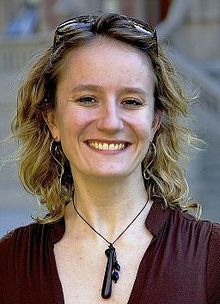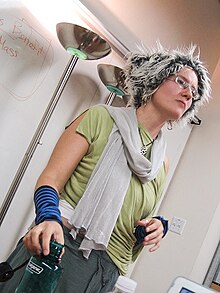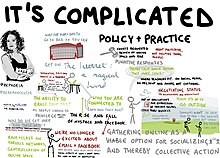danah boyd
danah boyd | |
|---|---|
 boyd in 2008 | |
| Born | November 24, 1977 |
| Nationality | American |
| Alma mater | |
| Known for | Commentary on sociality, identity, and culture among youth on social networks[2] |
| Awards | Technology Review TR35 Young Innovators 2010[1] |
| Scientific career | |
| Fields | Social media |
| Institutions | |
| Thesis | Taken out of context: American teen sociality in networked publics (2008) |
| Doctoral advisor | |
| Website | |
danah boyd (styled lowercase, born November 24, 1977 as Danah Michele Mattas)[3] is a technology and social media scholar. [4][5][6][7][8] She is a Principal Researcher at Microsoft Research, the founder and president of Data & Society Research Institute, and a Visiting Professor at New York University.
Early life
boyd grew up in Lancaster, Pennsylvania and Altoona, Pennsylvania,[9] and attended Manheim Township High School from 1992–1996. According to her website, she was born Danah Michele Mattas.[10] Once she reached college, she chose to take her maternal grandfather's name, boyd, as her own last name. She decided to spell her name in lowercase so as "to reflect my mother's original balancing and to satisfy my own political irritation at the importance of capitalization."[9][10] After her parents' divorce, in 1982, she moved to York, Pennsylvania, with her mother and her brother. Her mother married again during danah's third grade and the family moved to Lancaster, Pennsylvania. She used online discussions forums to escape from high school. She called Lancaster a "religious and conservative" city. Having had online discussions on the topic, she decided to start identifying as queer.[11]
A few years later, her brother taught her how to use IRC and Usenet. Even though she thought computers were "lame" at the time, the possibilities for connecting with others intrigued her. She became an avid participant on Usenet and IRC in her junior year in high school, spending a lot of time browsing, creating content, and conversing with strangers.[12]
Though active in many extra-curricular activities and excelling academically, boyd had a difficult time socially in high school. She assigns "her survival to her mother, the Internet, and a classmate whose misogynistic comments inspired her to excel."[12]
Her initial ambition was to become an astronaut but after an injury, she became more interested in the Internet.[9]
Education

boyd initially studied computer science at Brown University, where she worked with Andries van Dam and wrote an undergraduate thesis about how "3-D computer systems used cues that were inherently sexist."[9] She pursued her master's degree in sociable media with Judith Donath at the MIT Media Lab. She worked for the New York-based activist organization V-Day, first as a volunteer (starting in 2004) and then as paid staff (2007–2009). She eventually moved to San Francisco, where she met the individuals involved in creating the new Friendster service. She documented what she was observing via her blog, and this grew into a career.[13]
In 2008, boyd earned a Ph.D. at the UC Berkeley School of Information,[14] advised by Peter Lyman (1940–2007) and Mizuko Ito (aka Mimi Ito). Her dissertation, Taken Out of Context: American Teen Sociality in Networked Publics, focused on the use of large social networking sites such as Facebook and MySpace by U.S. teenagers,[15] and was blogged on Boing Boing.[16][17]
During the 2006–07 academic year, boyd was a fellow at the Annenberg Center for Communication at the University of Southern California. She was a long-time fellow at the Berkman Center for Internet & Society at Harvard University, where she co-directed the Internet Safety Technical Task Force,[18] and then served on the Youth and Media Policy Working Group.[19]
Career

While in graduate school, she was involved with a three-year ethnographic project funded by the MacArthur Foundation and led by Mimi Ito; the project examined youths' use of technologies through interviews, focus groups, observations, and document analysis.[20][21] Her publications included an article in the MacArthur Foundation Series on Digital Learning, Identity Volume called "Why Youth (Heart) Social Network Sites: The Role of Networked Publics in Teenage Social Life."[22] The article focuses on social networks' implications for youth identity. The project culminated with a co-authored book "Hanging Out, Messing Around, and Geeking Out: Kids Living and Learning with New Media."[23]
She published untraditional research on youth using Facebook and MySpace in 2007. She demonstrated that most young users of Facebook were white and middle-to-upper class, while MySpace users tended to be lower-class black teenagers. Her work is often translated and relayed to major media.[11]In addition to blogging on her own site, she addresses issues of youth and technology use on the DMLcentral blog. boyd has written academic papers and op-ed pieces on online culture.[24]
Her career as a fellow at Harvard's Berkman Center started in 2007. In January 2009, boyd joined Microsoft Research New England, in Cambridge, Massachusetts, as a Social Media Researcher.[25]
In 2013, boyd founded Data & Society Research Institute to address the social, technical, ethical, legal and policy issues that are emerging from data-centric technological development.
In early 2014, boyd published her book It's Complicated: The Social Lives of Networked Teens at Yale University Press.[26] In 2015, Henry Jenkins, Mimi Ito, and boyd published Participatory Culture in a Networked Era at Polity Press. She was interviewed in the 2015 web documentary about internet privacy, Do Not Track.[27]
Currently, boyd is president of Data & Society[28], a Principal Researcher at Microsoft Research and a Visiting Professor at New York University. She also serves on the board of directors of Crisis Text Line (since 2012),[29] as a Trustee of the National Museum of the American Indian, on the board of the Social Science Research Council, and on the advisory board of the Electronic Privacy Information Center (EPIC). boyd is currently focused on research questions related to "big data" and AI, bias and manipulation of data, and how technology shapes inequality.
Honors and awards
In 2009 Fast Company named boyd one of the most influential women in technology.[30] In May 2010, she received the Award for Public Sociology from the American Sociological Association's Communication and Information Technologies (CITASA) section.[31] Also in 2010, Fortune named her the smartest academic in the technology field[32] and "the reigning expert on how young people use the Internet."[33] In 2010, boyd was included on the TR35 list of top innovators under the age of 35.[34] She was a 2011 Young Global Leader of the World Economic Forum.
boyd has spoken at many academic conferences, including SIGIR, SIGGRAPH, CHI, Etechm Personal Democracy Forum, Strata Data and the AAAS annual meeting. She gave the keynote addresses at SXSWi 2010 and WWW 2010, discussing privacy, publicity and big data.[35][36][37] She also appeared in the 2008 PBS Frontline documentary Growing Up Online providing commentary on youth and technology.[38] In 2015, she gave the Everett Parker Lecture.
Foreign Policy named boyd one of its 2012 Top 100 Global Thinkers "for showing us that Big Data isn't necessarily better data".[39]
Personal life
She has an "attraction to people of different genders," but identifies as queer rather than lesbian or bi. "I very much attribute my comfortableness with my sexuality to the long nights in high school discussing the topic in IRC."[3] She has three children with her partner Gilad Lotan, an Israeli computer scientist.
References
- ^ MIT (2010). 2010 Young Innovators under 35, Danah Boyd, 32, Microsoft Research: Shaping the rules for social networks, Technology Review.
- ^ Heer, J.; Boyd, D. (2005). "Vizster: Visualizing Online Social Networks". Proceedings of the 2005 IEEE Symposium on Information Visualization (INFOVIS'05). p. 5. doi:10.1109/INFOVIS.2005.39. ISBN 0-7803-9464-X.
- ^ a b boyd, danah. "a bitty autobiography / a smattering of facts". danah.org. Retrieved November 2, 2008. She noted her mother added lowercase 'h' in birth name "danah" for typographical balance, reflecting the lowercase first letter 'd' and later changed her last name to lowercase "boyd" in 2000.
- ^ Danah boyd publications indexed by Google Scholar
- ^ Danah boyd publications indexed by Microsoft Academic
- ^ Danah Boyd at DBLP Bibliography Server
- ^ Donath, J.; Boyd, D. (2004). "Public Displays of Connection". BT Technology Journal. 22 (4): 71. doi:10.1023/B:BTTJ.0000047585.06264.cc.
- ^ Marlow, C.; Naaman, M.; Boyd, D.; Davis, M. (2006). "HT06, tagging paper, taxonomy, Flickr, academic article, to read". Proceedings of the seventeenth conference on Hypertext and hypermedia - HYPERTEXT '06. p. 31. doi:10.1145/1149941.1149949. ISBN 1595934170.
- ^ a b c d Debelle, Penelope (August 4, 2007). "A space of her own – Encounter with Danah Boyd". The Age. Australia.
- ^ a b Boyd, Danah. "What's in a Name?". danah.org. Retrieved March 30, 2008.
- ^ a b http://www.lemonde.fr/festival/article/2014/08/20/danah-boyd-anthropologue-de-la-generation-numerique_4473731_4415198.html
- ^ a b http://www.danah.org/aboutme.html
- ^ Erard, Michael (November 27, 2003). "Decoding the New Cues in Online Society". The New York Times. Archived from the original on June 4, 2012. Retrieved May 22, 2010.
{{cite news}}: Unknown parameter|deadurl=ignored (|url-status=suggested) (help) - ^ boyd, danah (2008). Taken out of context: American teen sociality in networked publics (PhD thesis). University of California, Berkeley.
- ^ "Voices on Antisemtisim interview with danah boyd". United States Holocaust Memorial Museum. October 22, 2009. Archived from the original on May 5, 2012.
{{cite web}}: Unknown parameter|deadurl=ignored (|url-status=suggested) (help) - ^ "Taken Out of Context – my PhD dissertation". zephoria.org. January 18, 2009.
- ^ Doctorow, Cory (January 19, 2009). "danah boyd's PhD thesis: Teen sociality online". Boing Boing. Retrieved May 22, 2010.
- ^ "Members of the Internet Safety Technical Task Force". Berkman Center for Internet & Society. Retrieved May 22, 2010.
- ^ "Youth and Media Policy Working Group Initiative".
- ^ "MacArthur Foundation Project Summary". Retrieved January 9, 2009.
- ^ "Final Report". The Digital Youth Project. Retrieved January 9, 2009.
- ^ boyd, danah. Buckingham, David (ed.). "Why Youth (Heart) Social Network Sites: The Role of Networked Publics in Teenage Social Life". Youth, Identity, and Digital Media. The John D. and Catherine T. MacArthur Foundation Series on Digital Media and Learning. Cambridge: MIT Press. 119–142. doi:10.1162/dmal.9780262524834.119. ISBN 978-0262026352. Retrieved May 16, 2010.
- ^ Ito, Mimi; et al. (September 2009). Hanging Out, Messing Around, and Geeking Out: Kids Living and Learning with New Media. MIT Press. ISBN 0-262-01336-3.
- ^ Shirky, Clay (February 28, 2008). Here Comes Everybody. Penguin Group. pp. 224–5. ISBN 978-1-59420-153-0.
- ^ McCarthy, Caroline (September 22, 2008). "Microsoft hires social-net scholar Danah Boyd". CNET. Retrieved January 12, 2009.
- ^ boyd, danah (2014). It's Complicated: The Social Lives of Networked Teens. Yale University Press. ISBN 9780300166316.
- ^ Davis, Nicola (April 14, 2015). "Do not Track: an online, interactive documentary about who's watching you". The Guardian. Retrieved April 15, 2015.
- ^ https://datasociety.net
- ^ https://www.linkedin.com/in/danahboyd
- ^ Fast Company Staff (February 1, 2009). "Women in Tech: The Evangelists". Fast Company. Retrieved May 22, 2010.
- ^ "2010 CITASA Awards". CITASA. 2010. Retrieved May 30, 2010.
- ^ Jessi Hempel; Beth Kowitt (September 7, 2010). "Smartest Academic: Danah Boyd". Fortune. Retrieved January 8, 2010.
- ^ Hempel, Jessi (2010). "Ones to watch: Danah Boyd". Fortune. Retrieved October 14, 2010.
- ^ Naone, Erica (2010). "Danah Boyd, 32". Technology Review. Retrieved August 25, 2010.
- ^ "danah boyd's Opening Remarks on Privacy and Publicity" (Press release). South by Southwest. March 14, 2010. Retrieved May 22, 2010.
- ^ Kincaid, Jason (March 13, 2010). "Danah Boyd: How Technology Makes A Mess Of Privacy and Publicity". TechCrunch. Retrieved May 22, 2010.
- ^ "Keynote Talk: danah boyd on "Publicity and Privacy in Web 2.0"". WWW 2010. April 29, 2010. Retrieved May 22, 2010.
- ^ "PBS Frontline: "Growing Up Online" with danah boyd – January 22nd" (Press release). Berkman Center for Internet & Society. January 14, 2008. Retrieved May 22, 2010.
- ^ "The FP Top 100 Global Thinkers". Foreign Policy. November 26, 2012. Archived from the original on November 30, 2012. Retrieved 28 November 2012.
{{cite web}}: Unknown parameter|deadurl=ignored (|url-status=suggested) (help)
External links
- A Discussion with danah boyd, Ibiblio Speaker Series, 2006
- An interview with danah boyd, Women of Web 2.0 Show, 2008
- danah boyd Interview at YouTube
- Friending Your Child by Lawrence Goodman, Brown Alumni Magazine, 2012
- 1977 births
- Living people
- American academics
- American bloggers
- Berkman Fellows
- Brown University alumni
- Human–computer interaction researchers
- Massachusetts Institute of Technology alumni
- People from Altoona, Pennsylvania
- Writers from Lancaster, Pennsylvania
- Pseudonymous writers
- Queer women
- University of California, Berkeley School of Information alumni
- MIT Media Lab people
